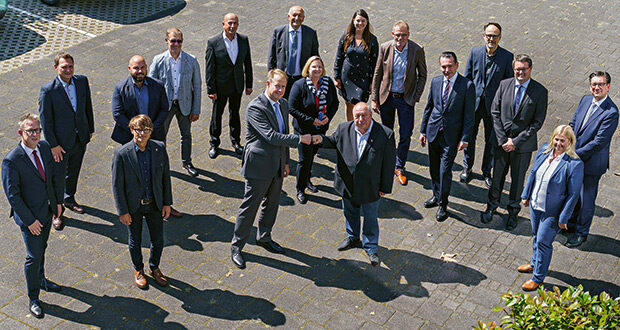On 25th August 2021, the industry association Branchenverband Steinkohle und Nachbergbau e. V. (bsn), Essen/Germany, and the German Trade Union for Mining, Chemicals and Energy (IG BCI), Hanover/Germany, signed the “Coal post-mining” collective agreement (Figure 1). Almost three years after coal production ceased in Germany, this marks the transition of collective bargaining regulations into the post-mining era and will help shape the future of RAG Aktiengesellschaft.
The provisions enter into force on 1st January 2022 and replace the collective bargaining regulations that have been in place in the German coal mining industry since 1919 – and developed over time – with a completely new system.
For employees, the new collective agreement includes modern pay and working conditions, including a uniform remuneration system that no longer differentiates between salaried employees and workers on an hourly wage. Employers and employee representatives also agreed on variable remuneration that guarantees a 5 % increase in income until 2024. Furthermore, both sides agreed on a pension remuneration component of 750 € annually, which employees are to use on their own initiative and responsibility to put towards a private pension provision. The negotiating partners paid particular attention to flexible working conditions. Modern flexitime accounts are being introduced and employees can organise their working hours in a flexible manner. Going forward, employees will be able to take time off on an hourly basis as well, and not just by the day.
“I am delighted that, after 100 years, we are able to start a new chapter in our collective history and have come up with intelligent solutions that have enabled us to put together a forward-looking and attractive package for our employees,” says Michael Kalthoff, President of bsn. He explains that these new regulations take account of the changes in work and opportunities at RAG.
Ralf Sikorski, Member of the Board with responsibility for collective bargaining policy and Deputy Chairman of IG BCE emphasises: “Today is an historic day. After over 100 years, we are closing a chapter in collective bargaining history for an entire industry.” He stresses: “With this new collective agreement, we have laid the foundation for a fantastic future for our colleagues, combining real material improvements with innovative elements and making it easier to maintain a work/life balance.”
Particularly in view of the work ahead of RAG and its employees in the post-mining era, Chair of RAG Board of Management Peter Schrimpf views the collective negotiations as a success: “The collective agreement takes all interests into account. It creates excellent prospects for the company and its employees and will allow us to shape the future of RAG together.”
Chair of RAG General Works Council Susanne Hardies is of a similar mind: “We went into negotiations with the aim of ensuring that our colleagues will enjoy an attractive and social working environment with interesting opportunities in the future too. We were successful.” (bsn/Si.)


